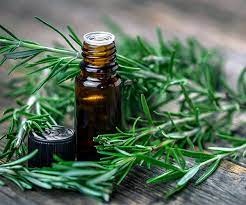Rosemary Oil Benefits for Your Skin
Rosemary Oil Benefits for Your Skin
The drying properties of rosemary oil make it feel good to touch and help keep the skin in balance.
Applying rosemary oil topically helps regulate the skin’s pH while clearing up greasy and acne-prone skin.

The antibacterial properties of rosemary oil help oily and acne-prone skin avoid outbreaks in the future.
Your skin looks younger and more luminous as a result of the stimulating stimulus that improves circulation in aging skin.
The stimulating, oxygenating, revitalizing, rejuvenating, and refreshing properties of rosemary essential oil are reminiscent of its mint family origins.
Many skin care products contain rosemary oil, particularly those for oily and acne-prone skin types.
Because rosemary oil moisturizes the skin, it can help regulate the production of oil.
Additionally, it gives the skin an antimicrobial surface that prevents acne.
Eczema sufferers can benefit from the antibacterial qualities of rosemary oil.
What is rosemary oil?
Essential oils derived from rosemary plants are known as rosemary oil, as you might expect.
The plant’s blossoms are used to extract it using steam distillation techniques.
For thousands of years, it has been gathered and used for its antioxidant, antimicrobial, and anti-inflammatory properties.
It has also been used for alleged benefits like memory enhancement and hair growth stimulation.
Recent research indicates that using rosemary oil in skincare products has several advantages.
Rosemary, or Rosmarinus officinalis, is a well-liked medicinal shrub with aromatic, evergreen leaves that resemble needles and purplish-blue flowers.
This scrub releases a pleasant, woodsy smell that quickly boosts your spirits and calms your senses when you rub the leaves between your palms.
The rosemary leaves are steam-distilled to produce the oil.
It takes on the essence of the plant as well as the herb’s energizing aroma.
In addition to its fragrance, rosemary has become more well-known for its advantages in skin and hair care.
It has been found to have potent antiseptic and anti-inflammatory qualities in addition to significant free radical scavenging action.
According to a study, rosemary oil also improves people’s short-term memory for numbers and images.
How to use rosemary oil for skin
There are numerous applications for rosemary oil on the skin, such as:
- Adding a little carrier oil and then applying it topically
- Putting a diluting solution into a hot bath and allowing it to penetrate your skin’s pores.
- Blend your preferred beauty product with rosemary oil and use as usual.
- When you need to spritz some essential oil onto your skin, use it in a prepared mixture.
- Add it to a soap formulation and incorporate it into your regular washing regimen.
- Similar to other essential oils, rosemary oil is extremely potent and needs to be diluted before being applied topically.
The best rosemary oil uses
Best practices of rosemary oil include the following:
- Rosemary oil is a great expectorant for clearing up phlegm: Cup your mouth and nose with a few drops between your palms and press them together for a few minutes to help clear your chest of mucus.
- For thick hair: It’s no secret that rosemary oil is a boon to those experiencing hair thinning.
Massage a mixture of one tablespoon of castor oil, two tablespoons of coconut oil, and a few drops of rosemary essential oil into your hair to increase its hair-thickening capabilities.
- It improves prostate health: The anti-inflammatory qualities of rosemary oil are quite effective in improving the health of the prostate.
To apply the oil under the testicles, simply mix a few drops of essential rosemary oil with a teaspoon of any carrier oil (olive or coconut oil works well).
- Muscle and joint pain relief: Allow rosemary essential oil’s anti-spasmodic and anti-inflammatory qualities to alleviate your aching muscles and joint problems.
To make a mixture, add a teaspoon of coconut oil and a few drops of peppermint and rosemary oils.
- For those who suffer from asthma, bronchitis, sinusitis, or nasal congestion due to a common cold, an essential oil diffuser infused with rosemary oil can offer comfort through its soothing aroma.
- To make your essential oil diffuser or vaporizer, add five or more drops of rosemary oil.
Rosemary oil benefits the skin
Rosemary oil benefits your skin overnight as well as during the day.
When used regularly, rosemary has many skin-benefiting properties that range from preventing acne to minimizing bags beneath the eyes.
A few of the most noteworthy are included here:
Use it to tame thin lines: Antioxidants included in rosemary oil help shield the skin from damaging free radicals and outside contaminants.
These are typically the causes of skin feeling droopy or small wrinkles showing up on your skin.
You can counteract these aging symptoms by putting a diluted mixture on your skin or incorporating rosemary essential oil into skin treatments.
Acne sufferers may find relief with rosemary oil: The antimicrobial qualities of rosemary may help stop bacteria from entering your pores if you’re experiencing an acne breakout.
Its non-comedogenic qualities combined with pore-cleansing action can help minimize breakouts and possibly even stop them from occurring in the future.
It makes your skin tone more even: You may notice an increase in the size of your skin’s pores, which could be caused by excessive exposure to the outdoors or simply the passage of time.
Your complexion will appear tighter if you use rosemary oil to reduce the size of your pores.
This could be the perfect natural remedy to utilize in addition to your current cosmetics if you have naturally oily skin.
Possibly lessen the appearance of bags beneath the eyes: The reason the eye seems swollen in the morning is due to a collection of fluid in the tissue beneath it.
The diuretic qualities of rosemary oil can aid in the removal of excess fluid, smoothing out the skin, lessening puffiness and swelling, and looking less like unattractive bags.
Use on skin to lessen irritation: It can be challenging for anyone dealing with skin issues like rosacea or eczema to strike the correct balance when it comes to makeup.
Rosemary’s anti-inflammatory properties might help to lessen the redness that some skin conditions cause.
It offers complete skin protection when paired with its antibacterial and antioxidant qualities.
Other uses include:
- It might be able to eliminate cellulite.
- It can be used as a natural deodorizer.
- Reduces insects and mosquitoes
- Strengthens hair
- Eliminates pimples and combats aging symptoms
- Aids in reducing stress
- Functions as a depression remedy
- Relieves stress and tiredness
- Enhances mental ability
- Promotes healthy liver function and helps with detoxification
- Improves dental health
- Avoids sexually transmitted diseases
- Eliminates offending odor
- Promotes cancer prevention
- Reduces stress
- Aides in enhancing respiratory function
- Alleviates flu, cold, and cough
Rosemary oil benefits for your skin whitening ~ Rosemary oil for skin whitening
By massaging rosemary oil into the skin, one can create the appearance of youthfulness by illuminating dark spots and imperfections.
The anti-inflammatory properties of rosemary extract help to lessen skin puffiness and edema.
Along with calming the skin and helping burns heal, it has other uses as well.
Rosemary oil benefits for your skin eczema
The antibacterial qualities of rosemary oil are helpful for skin disorders including dermatitis.
Regularly massaging rosemary oil over afflicted skin helps get rid of dryness and peeling.
Rosemary oil benefits your skin and hair
Considering it is an antioxidant, rosemary promotes healthier, more youthful skin by scavenging free radicals.
Rosemary stimulates blood flow, which helps lessen the swollen, puffy appearance that we frequently experience around the eyes.
Calming: If you suffer from dry, itchy scalps, try using the essential oil of rosemary.
Rosemary oil benefits for hair
Many people have effectively utilized rosemary to encourage hair growth.
It’s possible that using rosemary essential oil will have the same effect on you.
The essential oil is thought to protect against hair loss especially that associated with male or female pattern baldness, based on both scientific research and firsthand experience.
Rosemary oil on the face overnight
Add a few drops of skin-benefitting rosemary oil to carrier oil, such as jojoba or coconut oil.
Spread it evenly over your face and massage it in. If you choose, you may even leave it overnight and wash your face the next day.
Use it a couple of times a week to balance out your skin tone and minimize fine wrinkles.
Rosemary oil for skin pigmentation
Rich in anti-inflammatory and skin-healing qualities, rosemary oil evens the complexion and removes dark spots and blemishes.
It’s a great way to get rid of pigmentation at home.
Rosemary oil side effects
However, consuming significant amounts of rosemary leaves or undiluted rosemary oil is probably dangerous.
Large doses of rosemary might make you throw up, sensitive to the sun, and irritate your skin.
Most people may not have any problems using rosemary oil topically.
Some people may experience allergic reactions to it. Some people may experience allergic responses when using rosemary oil.
For instance, sensitive people may have skin sensitivity while using rosemary oil topically.
Because of this, it’s crucial to test products containing rosemary oil, such as massage oils and scalp treatments, on a tiny area of skin before using them on more exposed skin.
When using rosemary oil as an aromatherapy treatment or after applying it topically to your skin, if you have any irritation of your skin or airways, cease using it and seek medical assistance.

Conclusion
Studies conducted by scientists are validating the long-held belief in the medicinal benefits of rosemary essential oil, which is extracted from the common culinary herb.
Although the majority of the study is preliminary, studies suggest that this essential oil may improve mental clarity and memory, prevent hair loss, reduce pain and inflammation, ward off some insects, and reduce stress.
Try inhaling some rosemary oil or using a diluted topical solution if you’re interested.
Just a few drops at a time are required because the oil is highly concentrated.
FAQs
Is rosemary oil good for your face?
Rosemary oil tones and balances the skin while acting as a cool astringent.
Applying rosemary oil topically helps regulate the skin’s pH while clearing up greasy and acne-prone skin.
Because of its antibacterial properties, rosemary oil can help oily and acne-prone skin avoid further outbreaks.
Is rosemary good for skin lightening?
By massaging rosemary oil into the skin, one can create the appearance of youthfulness by illuminating dark spots and imperfections.
The anti-inflammatory properties of rosemary extract help to lessen skin puffiness and edema.
Moreover, it helps to calm the skin and promote burn recovery.
Does rosemary oil remove dark spots?
It’s not nice to have dark patches on your face, and there aren’t many essential oils that can help.
Thankfully, essential oils containing rosemary are not among them.
It is used to erase dark spots or blemishes to give the skin a more even tone since it increases circulation and kills microorganisms.
How long does rosemary oil take to work on the skin?
From three to six months
According to Garshick, the effects of rosemary oil can take three to six months to manifest.
Does applying rosemary oil topically irritate or burn? Stop utilizing the product for the time being.
How do you use rosemary oil for glowing skin?
For radiant, clear skin, combine a pinch of turmeric powder and two drops of essential rosemary oil with three tablespoons of yogurt.
Apply the mixture to your face, let it sit for twenty minutes, and then rinse it off with cold water.
Can I mix rosemary oil with my face cream?
If you enjoy using essential oils for skin care together with a fresh, invigorating aroma that lingers, this one is a must-have.
Without making your skin oily, it softens and gives you a natural glow.
As you would with any other facial moisturizer, add one drop of rosemary oil before applying the mixture.
Does rosemary oil make skin glow?
The skin is stimulated and left glowing by rosemary oil.
It is well-recognized to promote oxygenation and blood circulation, which will leave your skin looking radiant.
How do you use rosemary for beauty?
- Oatmeal and rosemary mask or scrub: Using a mortar and pestle, food processor on pulse, or hand crank grater (typically for cheese), finely crush oats and dried rosemary.
- Combine with cooled, boiling water for oily skin.
- Milk and 1 T honey (moisturizing) are good for dry skin.
- Apply topically to the entire face; rinse after 15 minutes.
Can I leave rosemary oil on my face overnight?
Add a few drops of skin-benefitting rosemary oil to carrier oil, such as jojoba or coconut oil.
Spread it evenly over your face and massage it in. If you choose, you may even leave it overnight and wash your face the next day.
Use it a couple of times a week to balance out your skin tone and minimize fine wrinkles.
Does rosemary oil darken?
Darker hair tones might have their color softly enhanced and deepened by it.
Keep in mind that rosemary won’t take the place of professional hair color or dye jobs and that its darkening effects will be subtle and short-lived.
Can rosemary cure pimples?
Rosemary essential oil has strong antibacterial properties that help prevent acne bacteria from penetrating your pores.
Because of its ability to unclog pores and create a barrier that keeps future outbreaks at bay, rosemary oil effectively prevents acne.
This characteristic is coupled with its non-comedogenic qualities.
How to use rosemary for clear skin?
se carrier oils like avocado or argan to dilute the essential oil of rosemary if you have DRY skin.
Use carrier oil, such as hemp or grapeseed, to dilute the essential oil of rosemary if you have a combination of oily skin.
Use a combination of pomegranate and jojoba oils to reduce the concentration of the rosemary essential oil for normal skin.
What will happen if I stop using rosemary oil?
Similar to other external home remedies, applying rosemary oil topically to the scalp does not ensure that it will stimulate hair follicles to move from the Telogen stage of the Hair Cycle to the Anagen (hair growing) stage.
As a result, ceasing to use it won’t affect the growth of new hair.
What can I dilute rosemary oil with?
To lessen its strength and avoid irritation, dilute rosemary oil with carrier oil.
Common options for carrier oils are almond, coconut, jojoba, and argan oils.
Five drops of rosemary oil diluted with ten milliliters of carrier oil is a typical ratio.
Can you leave rosemary oil on your skin?
You can topically apply or inhale rosemary oil. Apply a few drops at a time because of the high concentration.
The plastic droppers found in the tiny bottles it comes in make single-droplet dispensing simpler.
What is the best oil to mix with rosemary oil?
By diluting rosemary oil, you can lessen its potency and lower the likelihood that it will irritate your skin.
Plant oils like almond, jojoba, and argan oil are examples of carrier oils.
Due to their function in diluting essential oils and “transporting” them to your skin, they are also carrier oils.
How do you get the best results from rosemary oil?
Adding, “It is best to use rosemary oil mixed with carrier oil like argan, jojoba, or coconut oil,” Dr. Green warns against using pure rosemary oil straight on the scalp—especially for people with sensitive skin.
In addition, she adds you can mix rosemary oil into your shampoo or any other post-shower hair care products.
Does rosemary oil have side effects?
However, consuming significant amounts of rosemary leaves or undiluted rosemary oil is probably dangerous.
Large doses of rosemary might make you throw up, sensitive to the sun, and irritate your skin.
Most people may not have any problems using rosemary oil topically. Some people may experience allergic reactions to it.


